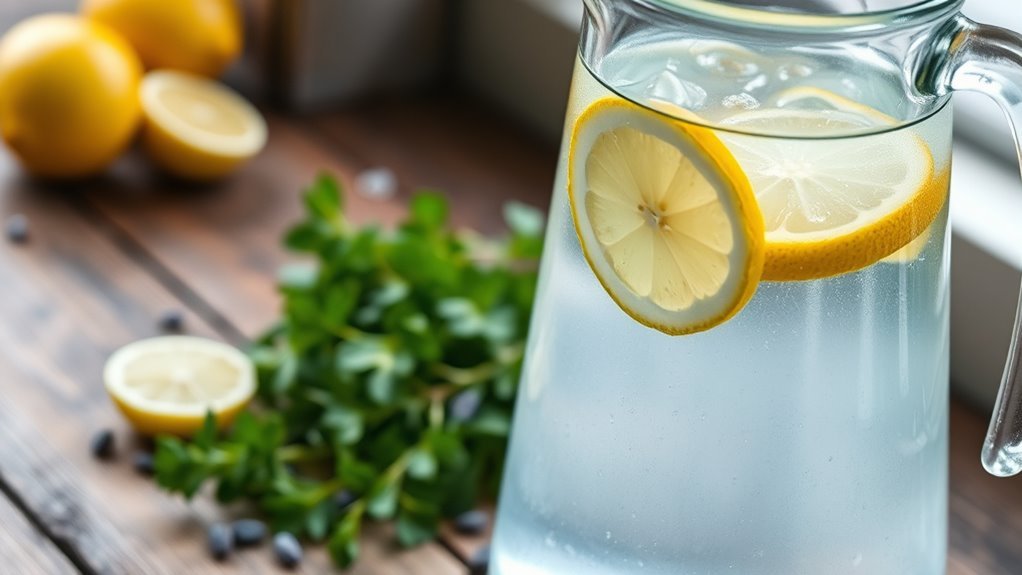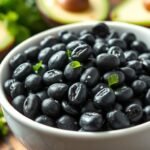On a keto diet, it’s important to drink at least half your body weight in ounces of water each day. This helps counteract fluid loss due to reduced carbohydrates and increased urination. Proper hydration supports your energy levels and overall well-being. Remember, factors like age, activity, and climate may affect your water needs. If you’re keen on optimizing your hydration strategy, there’s more to explore about maintaining balance on keto.
Understanding Keto and Its Impact on Hydration
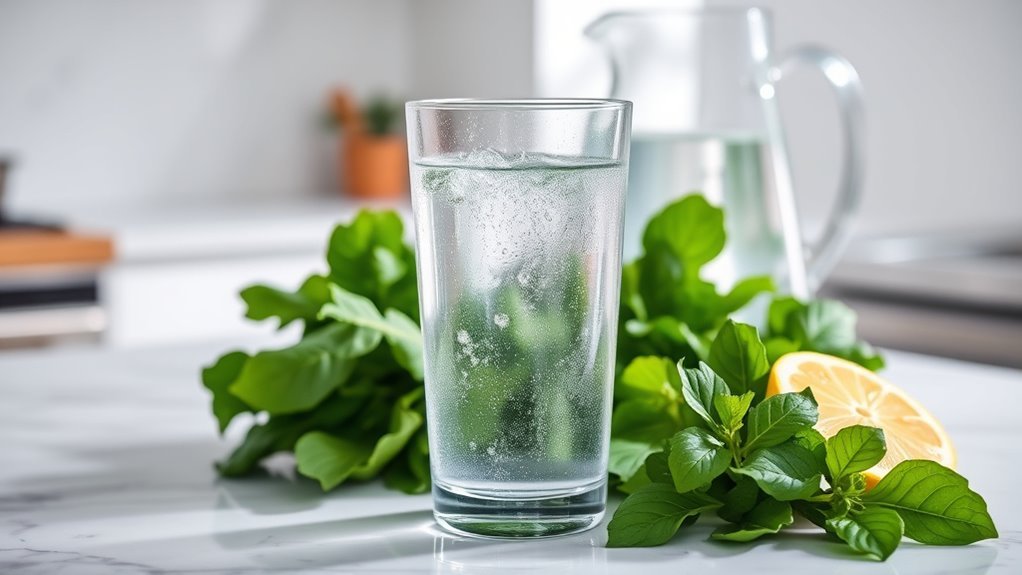
When you commence on a keto diet, understanding how it affects your hydration is essential. The keto basics involve a significant shift in how your body metabolizes energy, leading to changes in fluid balance. As you reduce carbohydrates, your insulin levels drop, prompting your kidneys to excrete excess sodium and water. This can result in increased urination and potential dehydration. That’s why hydration importance can’t be overstated during this change. You’ll need to compensate for the loss of fluids by drinking more water and considering electrolytes. Staying adequately hydrated supports ideal energy levels, digestion, and overall well-being, allowing you to embrace the freedom of the keto lifestyle without the hindrances of dehydration. Adjust your water intake accordingly for the best results.
Factors Affecting Water Needs on a Keto Diet
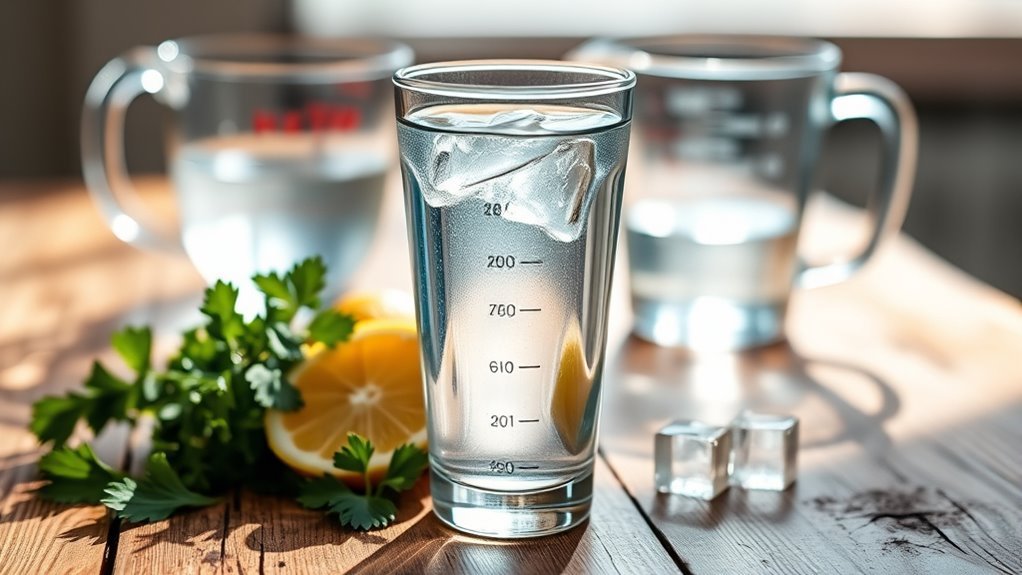
As you adapt to a keto diet, several factors can influence your water needs. Age factors play a role, as older individuals may require more hydration due to decreased kidney function. Your activity levels also matter; if you’re exercising intensely, you’ll need to replenish lost fluids. Climate considerations can’t be overlooked, either—hot or humid weather can lead to increased perspiration, necessitating more water intake. Finally, dietary variations, such as higher salt consumption or protein intake on keto, can affect hydration levels. It’s essential to listen to your body and adjust your water intake based on these factors. Staying properly hydrated will support your overall well-being and enhance your keto experience.
Recommended Daily Water Intake for Keto Followers
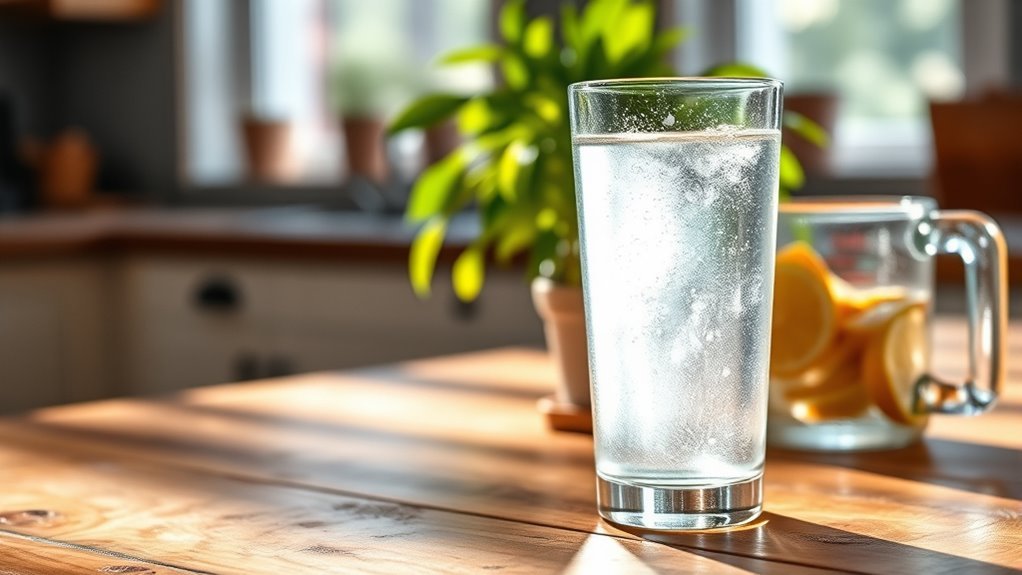
To guarantee peak hydration on a keto diet, it’s generally recommended that adults drink at least half their body weight in ounces of water each day. This affirms proper keto hydration and supports overall health. Your daily intake might vary based on activity levels and individual needs, so listen to your body.
| Weight (lbs) | Recommended Water (oz) | Daily Intake (cups) |
|---|---|---|
| 150 | 75 | 9.4 |
| 180 | 90 | 11.3 |
| 200 | 100 | 12.5 |
Signs of Dehydration on a Ketogenic Diet
While following a ketogenic diet, it’s essential to recognize the signs of dehydration, as the shift to a low-carb lifestyle can lead to increased fluid loss. Many hydration myths suggest you only need to drink when thirsty, but that may not be enough on keto. Watch for these dehydration symptoms:
- Dry Mouth: A persistent dry feeling in your mouth could indicate you’re not drinking enough.
- Fatigue: Feeling unusually tired or sluggish can be a sign that your body needs more water.
- Headaches: Frequent headaches may signal dehydration, especially when you’re adjusting to a keto diet.
Staying aware of these signs can help you maintain your hydration levels and enjoy your keto journey to the fullest.
Tips for Staying Hydrated While on Keto
Recognizing the signs of dehydration is just the first step; maintaining proper hydration is essential on a ketogenic diet. To stay hydrated, consider these hydration hacks. First, aim for at least half your body weight in ounces of water daily. If plain water gets boring, try adding natural water flavors like lemon, cucumber, or mint to keep things interesting. Herbal teas are another great option, providing hydration while adding variety. Remember to sip water consistently throughout the day rather than chugging it all at once. Carry a reusable water bottle to remind yourself to drink regularly. Finally, set reminders on your phone to help you stay on track. Staying hydrated enhances your energy and supports overall well-being on your keto journey.
The Role of Electrolytes in Hydration
Hydration isn’t just about water; electrolytes play an essential role in maintaining fluid balance in your body, especially on a ketogenic diet. When you’re low in carbs, your body excretes more electrolytes, which can lead to imbalances. To guarantee proper electrolyte balance, consider these key hydration sources:
- Sodium: Helps retain water and supports nerve function. Use sea salt or broth to boost your intake.
- Potassium: Aids in muscle function and hydration. Foods like avocados and leafy greens are excellent sources.
- Magnesium: Important for muscle relaxation and overall health. Incorporate nuts, seeds, or supplements as needed.
Hydration Strategies for Active Individuals on Keto
How can you guarantee you’re staying properly hydrated while following a ketogenic diet and maintaining an active lifestyle? Start by adopting effective hydration techniques tailored for your workouts. Aim to drink water consistently throughout the day, not just during exercise. Consider using electrolyte-rich beverages, especially post-workout, to replenish lost minerals that are essential on keto.
Before your workout, hydrate well to enhance performance and prevent fatigue. During exercise, sip water regularly to maintain ideal workout hydration, aiming for about 7-10 ounces every 20 minutes. Afterward, rehydrate with water or an electrolyte drink to support recovery. By prioritizing these strategies, you’ll empower your body to thrive on keto while staying active and feeling your best.
Frequently Asked Questions
Can I Drink Coffee or Tea Instead of Water on Keto?
You can enjoy coffee and tea on keto, but they shouldn’t replace your water intake. Coffee boasts benefits like enhanced focus and metabolism, while tea options like green or herbal provide antioxidants. Both can keep you hydrated, but remember they can also act as diuretics. So, balance is key. For best health, you’ll want to combine these beverages with plenty of water to guarantee you stay hydrated and energized throughout your day.
Is Flavored Water Acceptable on a Ketogenic Diet?
Flavored water can definitely be a revitalizing choice on a ketogenic diet, as long as you stick to keto-friendly flavors. Look for options that use natural extracts or zero-calorie sweeteners. Citrus, berry, and mint flavors are great for adding a little zest without the carbs. Just be sure to check the labels for any hidden sugars. Staying hydrated with tasty options can make your keto journey more enjoyable and sustainable!
What Happens if I Drink Too Much Water on Keto?
You might think there’s no such thing as too much water, but drinking excessive amounts can lead to water toxicity. This condition disrupts your electrolyte balance, potentially causing symptoms like headaches, nausea, or confusion. While hydration is vital, it’s important to listen to your body and recognize signs of overhydration. Aim for a balanced intake to keep your electrolytes in check and enjoy the freedom of feeling good while staying hydrated.
Are There Any Specific Hydration Tips for Intermittent Fasting on Keto?
When you’re combining intermittent fasting with a keto diet, you’ll want to adopt some effective hydration strategies. Drinking water, herbal teas, or electrolytes can enhance the fasting benefits by keeping you energized and focused. It’s essential to stay mindful of your hydration levels, especially since both practices can lead to dehydration. Aim for regular sips throughout your fasting window, ensuring you feel good and maintain peak health while enjoying your freedom.
Can Dehydration Affect My Weight Loss on the Keto Diet?
Imagine your body as a car; without fuel, it sputters and stalls. Dehydration can cause symptoms like fatigue and dizziness, which might lead to a frustrating weight loss plateau. When you’re not properly hydrated, your metabolism slows down, hindering your progress. By staying mindful of your water intake, you help your body run smoothly. Remember, hydration isn’t just about thirst; it’s about fueling your journey to freedom and health.
Frequently Asked Questions
1. How much water should I drink while on a keto diet?
While there is no one-size-fits-all answer, a common guideline is to drink at least 64 ounces (about 2 liters) of water daily. However, many individuals on a keto diet may require more due to increased water loss and electrolyte changes. Aiming for 1 to 1.5 gallons (3.8 to 5.7 liters) can be beneficial, especially during the initial phases of the diet.
2. Why do I need to drink more water on a keto diet?
On a keto diet, your body enters a state of ketosis, which involves burning fat for fuel instead of carbohydrates. This process can lead to increased water loss through urination, as glycogen (the stored form of carbs) holds onto water. Additionally, low carbohydrate intake can lead to a decrease in insulin levels, further promoting the excretion of water. Therefore, it is crucial to stay well-hydrated to avoid dehydration and support kidney function.
3. What are the signs of dehydration on a keto diet?
Signs of dehydration can include symptoms such as dry mouth, fatigue, dizziness, headaches, and dark yellow urine. On a keto diet, you may also experience muscle cramps, increased thirst, and a general feeling of lethargy. If you notice any of these signs, it’s important to increase your water intake and consider replenishing electrolytes as well.
4. Can I drink other beverages instead of water on a keto diet?
Yes, you can include other beverages as part of your hydration strategy on a keto diet. Options such as herbal teas, black coffee, and sparkling water are great alternatives. However, be cautious with beverages that contain added sugars or carbohydrates, which can interfere with ketosis. Always check labels for hidden carbs if you’re consuming flavored drinks.
5. Should I consider electrolyte supplements on a keto diet?
Yes, electrolyte supplements can be beneficial on a keto diet, especially during the initial adjustment phase. As your body adapts to ketosis, you may lose significant amounts of sodium, potassium, and magnesium. Replenishing these electrolytes can help prevent symptoms of the “keto flu,” such as headaches, fatigue, and muscle cramps. Consider incorporating electrolyte-rich foods or supplements to maintain balance while staying hydrated.
References
- https://www.ncbi.nlm.nih.gov/pmc/articles/PMC5968774/
- https://www.healthline.com/nutrition/keto-diet-and-water-intake
- https://www.webmd.com/diet/what-is-the-keto-diet
- https://www.mayoclinic.org/healthy-lifestyle/nutrition-and-healthy-eating/in-depth/keto-diet/art-20460303
- https://www.cdc.gov/nutrition/data-statistics/know-your-limitations/healthy-hydration.html
- https://www.ncbi.nlm.nih.gov/pmc/articles/PMC6832485/
- https://www.ketogenic.com/what-is-the-ketogenic-diet/
- https://www.hsph.harvard.edu/nutritionsource/water/
